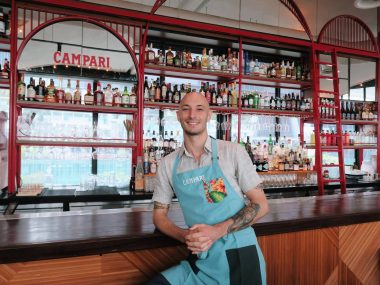
Bak Kut Teh, when translated from the Hokkien language literally means pork bone tea, and that’s a pretty accurate description of this popular Malaysian dish of Chinese heritage. It essentially consists of pork ribs simmered in a rich herbal tea broth that comes in varying versions depending on the region of origin. It is a meal that must be accompanied by Chinese tea to “wash down” the richness of the meat.
Bak Kut Teh is said to have Hokkien roots even though there are predominant Cantonese and Teochew iterations, depending on the region. In Klang, where the Hokkien community dominates, the broth is generally dark brown, viscous, and savoury, and people usually have it for breakfast. In Kuala Lumpur, where the Cantonese version prevails, the soup base is generally clear with strong Chinese medicinal herb aromas, and there is no preference for dining time-of-day.
There is, of course, “no tea in preparing the broth”, explains Mr Hew Sai Fan, owner of Ee Fatt Restaurant, the iconic Bak Kut Teh shop located in Pudu, a bustling district in the heart of Kuala Lumpur, Malaysia. This 40-year old establishment is probably one of the last Bak Kut Teh restaurants in this area serving the Cantonese version. Mr Hew, a second-generation owner reveals his lifelong journey of being a small business owner and his future plans now that Ee Fatt Restaurant has ceased operations since 7th July 2020.
“I gave my youth and most of my life to this industry: don’t work in this industry”. That’s the persistent words Mr Hew repeated when we sat down for an interview with him during the final days of his restaurant’s operations.
“It’s not a glamorous job – the hours are long, the work is physically exhausting.” Yet, for over 40 years, Mr Hew has been faithfully selling Bak Kut Teh. Due to the severe loss of sales in the last five months from the effects of Covid-19, he decided to retire early. Mr Hew shares that the rules of social distancing in dining and the restrictions that come with it significantly impacted the business. “It was the final nail to the coffin, and there is no third generation to take over. My children are educated and not interested in taking over the business – that is the reality of hawkers. So, I decided to retire now instead.”
Ee Fatt Restaurant was started by Hew’s father, Mr Hew Foong Loon on 1st April 1980 and is known for its signature clear Bak Kut Teh soup. One can quickly identify their soup style contributed by the generous heady dose of Chinese angelica root ( known as 当归 dong gwai in Cantonese). Other notable medicinal herbs include guai pei, licorice root (甘草 , known as kam chou in Cantonese) – these are the few base ingredients that make up the herbal broth. “In the 1970s, my father started with a roadside Bak Kut Teh stall. A friend taught him a recipe for another version of Bak Kut Teh and soon, we moved to this current shop and have been serving this version ever since. There is no modification or improvisation to the recipe, even though the cost of ingredients was gradually increasing over the years.”
Our days start at 2am with preparation work – that is our business trait, there is no difference between day and night.
I entered this industry since I was 13. Every day, I would help my father set up shop, serve customers, prepare our broth. In the afternoon, after a quick shower in our shop, I will head to school, which (and still is) near our shop – Confucian High School.
Our days start at 2 am with preparation work – that is our business trait, there is no difference between day and night. At 4 am, our shutters will be open and ready to serve Bak Kut Teh to our customers. We have all types of customers that come through our doors.
In the wee hours, it will be tired workers who have just finished their night shifts, and late-night drinkers who have their breakfast before heading back home. In the early morning, the crowd will shift to elderly regulars chatting about their prime years. As the day progresses, we see a mix of younger regulars, new customers, and office workers. By 1 pm, we would have finished most of our offerings, except for the offals, innards or odd cuts.
We would sell Bak Kut Teh every day, seven days a week. We do not go for any breaks during holidays and festive seasons. During Chinese New Year, we only close our shutters during Chor Yat (first day of Chinese New Year), and business resumes the next day.
Such is the life of a hawker. So long as we can accommodate, we are happy as long as our customers are satisfied. I am Hakka, and yet I sell Bak Kut Teh. A stall that sells Penang Char Koay Teow does not necessarily mean the owner is from Penang.
This business is not entirely about passion but a livelihood to many of us.
I am content with having enough to spend. As you grow older, you must know how to let go. For me, I have no burdens, no debts; my children are all grown up. It is time to retire. While I am still able, I would like to travel and see the world.
Mr Hew’s story is one of many others that aging hawkers have to tell from an old trade that is fading in the food scene. It is indeed a pity to see a 40-year old establishment close its doors for good due to Covid-19. Mr Hew’s rich and unctuous Bak Kut Teh recipe that has held the test of time for 40 years will be sorely missed by many.
Interview, photography and words by Theri B. Edited by Lim Aileen.












